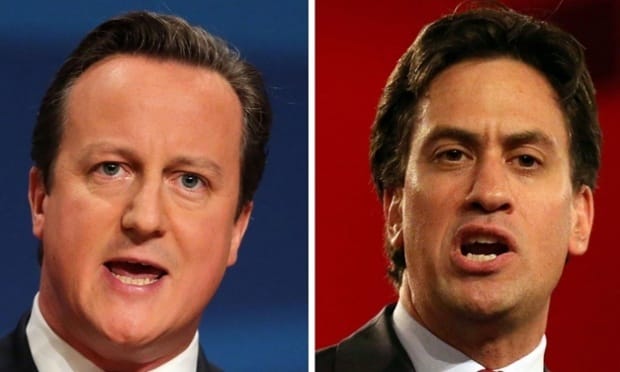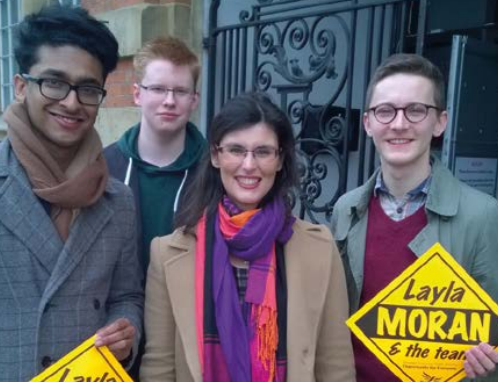Election 2015: Labour versus Conservative policies
Joshua Renken gives a break down of the policy platforms for the United Kingdom's two biggest parties

Regardless of the precise results of this May’s general election, only two men are in with a chance of leading the country over the next parliament: the incumbent Prime Minister David Cameron or the Leader of the Opposition Ed Miliband. In the last five years we have seen a surge in support for smaller parties including UKIP and the Greens, together with more established smaller parties such as the SNP and the Liberal Democrats, but the fact remains: Cameron or Miliband will win the keys to Downing Street. Whether it’s in a majority government, minority government or some form of coalition, Labour or the Conservatives will be leading the country.
Whether you intend to vote for one of these parties or not, it is important to have an understanding of their policies. Labour and the Conservatives still dominate Westminster, receiving almost two thirds of the votes and winning over five sixths of the seats in the House of Commons in 2010. So what are the differences between them?
Below is a breakdown of where the Labour Party and the Conservative Party differ on key issues.
Immigration
David Cameron has proposed to make migrants wait four years before they can claim certain benefits, such as tax credits, access to social housing or Universal Credit. The Conservatives also want to prevent migrants from claiming child benefit for dependents living outside the UK, in addition to removing immigrants that have failed to find work after six months. The prime minister has pledged to put reform of EU free movement rules at the centre of his renegotiation of Britain's relationship with the EU. The Conservatives are continuing to aim to bring net immigration down to below 100,000 people a year. The party has so far failed to deliver on this promise that featured in its 2010 manifesto. The figure currently stands at 243,000.
Labour has promised to enact stronger border controls to combat illegal immigration and Ed Miliband has spoken of introducing "smarter" targets in order to decrease the migration of low-skilled workers, while ensuring high-skilled workers and university students are not deterred. Labour plan to outlaw employment agencies who only recruit abroad and will increase the fines handed out to those who employ illegal immigrants.
Taxes and the economy
The Conservatives will aim to get rid of the deficit by 2018 and secure an overall budget surplus by the year 2019-20. This will be achieved through spending cuts to public services instead of tax rises, while increasing NHS spending. Mr Cameron has promised an income tax cut for 30 million people by 2020. Tax would be taken past £12,500 a year in earnings, instead of £10,500 and the higher tax rate of 40% would come in at £50,000 instead of £41,900 by 2020. These changes will be paid for through additional spending cuts and economic growth.
Ed Miliband has spoken of getting the current budget into surplus and the national debt falling "as soon as possible in the next parliament," while ensuring that no additional borrowing is undertaken for new spending. Labour would reintroduce the 50p top rate of income tax for earnings over £150,000 and bring back the 10p tax rate, cutting income tax for 24 million people. These changes would be paid for by scrapping the Married Couples' Tax Allowance. Miliband has talked of placing a tax on bankers’ bonuses and bringing in a "mansion tax" on properties worth over £2m. Labour also want to put UK overseas territories that refuse to co-operate with tax avoidance investigations on an international blacklist.
The NHS
The Chancellor George Osborne has pledged to put an extra £2bn into frontline health services across the UK as part of a larger plan to increase NHS funding, with the ambition that everyone would be able to see a GP seven days a week by 2020. The Conservatives also want to recruit 5,000 more doctors.
The Shadow Chancellor Ed Balls has said Labour would commit an extra £2.5bn a year above Mr Osborne’s plan to fund the NHS in the next parliament. This extra funding would come from the proposed "mansion tax", from clamping down on tax avoidance by big corporations and from a new tax on tobacco companies. Labour would scrap the Health and Social Care Act and put a stop to the "creeping privatisation" of the NHS, while working towards the goal of ensuring people need not wait more than two days before seeing a GP. Miliband set out a plan to integrate health and social care services into one system and give greater priority to mental health services. Shadow Health Secretary Andy Burnham would replace the Cancer Drugs Fund in England with a £330m fund and increase the proportion of the mental health budget spent on children.
Security, defence and foreign affairs
David Cameron would hold an in-out referendum on Britain's membership of the EU by 2017, after spending two years negotiating in Brussels for the return of certain powers such as greater control of net immigration and limiting the number of migrants claiming benefits. The Conservatives would protect the foreign aid budget and replace the Trident nuclear defence system.
Labour would push for reform of the EU and would not hold an in-out referendum in the next parliament. Miliband has promised to renew Trident if elected.
Benefits and Poverty
The Conservatives would not increase benefits for working-age people for two years as part of the austerity cuts, saving £3bn. This would affect those receiving jobseekers' allowance, income support, tax credits and child benefit. David Cameron would also cut the maximum amount a household can claim each year from £26,000 to £23,000. The Conservatives would stop paying Jobseeker's Allowance to young people who have been unemployed for more than six months unless they take part in "community projects". David Cameron would ban zero-hours contracts that stop people getting work elsewhere and work to raise the personal allowance (the point at which you start paying income tax) from £10,000 to £11,000 in April 2016 and then to £12,500 by 2020. Young people who have been out of work, education or training for six months will have to do unpaid community work to receive benefits and 18 to 21-year-olds would no longer be entitled to housing benefit. Benefits such as free bus passes, TV licences and winter fuel allowances for pensioners will be protected as it has been in the last parliament.
Labour would freeze energy prices up to 2017 and increase the minimum wage from £6.50-an-hour to £8-an-hour by 2020. Rises in child benefit would be capped at 1% for the first two years of the next parliament and the winter fuel allowance would be withdrawn from the wealthiest pensioners. Miliband has promised to repeal the “spare room subsidy” - more commonly known as the "bedroom tax"- and cap rail fares. Labour want to increase the length of paid paternity leave available to new fathers from two to four weeks, and increase statutory paternity pay to £260 a week.
Jobs
The Conservatives would use some of the money saved from benefit cuts to create three million apprenticeships.
Ed Miliband has said he would ban almost all zero hour contracts and work to guarantee a job for people under the age of 25 who have been unemployed for over a year.
Education
In a Conservative administration England’s schools budget will not be cut (between ages 4-16) but the funding per pupil will not keep pace with inflation. The party aims to convert the schools judged by Ofsted to "require improvement" into academies. The Conservatives are opposed to giving 16 and 17 year olds the vote for general and local elections in England, while Labour support the drop in voting age.
Labour plan to increase the overall education budget in England by at least the rate of inflation. This includes the budget for schools, nurseries, Sure Start and provision for 16-to 18-year-olds, although per-pupil funding is not specifically protected, meaning some of the increase will be eaten up by rising pupil numbers. The parents of primary school children would be guaranteed childcare from 8am to 6pm and the amount of free childcare for 3-4 year olds would be increased from 15 to 25 hours a week. Labour would make sex and relationship education compulsory in all schools and ensure that primary school class sizes do not exceed 30 pupils.
Housing
David Cameron has pledged that, if elected, first-time buyers in England under 40 will be able to buy a house at 20% below the market rate. He also plans to build 200,000 starter homes specifically for first time buyers. The Conservative manifesto has promised to create 1.3 million "right-to-buy" housing association homes for families.
Labour would aim to build 200,000 houses a year by 2020 and cap rent increases in the private sector. Miliband has also pledged to scrap letting fees to estate agents and give “greater powers” for councils to reduce the number of empty homes.
Law and Order
The Conservatives have promised to ban orders to outlaw groups that incite hatred and issue Extremism Disruption Orders (EXDOs) to stop "disruptive" individuals from speaking in public or holding a position of authority. New laws would be created to make it easier for the police to collect information about internet activity by suspected criminals, a new law would set out victims’ rights and the Human Rights Act would be replaced with a national Bill of Rights to give UK courts and Parliament the "final say".
Labour want to scrap Police and Crime Commissioners, while creating a new commissioner on domestic and sexual abuse, and give residents access to police planning meetings. Miliband has pledged to bring back control orders to combat extremism and ban convicted child sex offenders from working with children, while giving more money for frontline policing to prevent cuts in officer numbers.
This is not a fully comprehensive layout of each party’s entire policy platform, and cannot account for potential concessions that will have to be made in the likely event of a hung parliament, but does give you an idea of what to expect over the coming years.
There are many other news articles and webpages that go into much further detail about what the different parties are proposing for the next parliament. Completing short online questionnaires and visiting political party comparison sites such as www.whoshouldyouvotefor.com, http://election2015.votematch.org and www.voteforpolicies.org.uk will give you a good idea of whom you align with, as well as reading their manifestos. It is also possible to go online and look at how your local MP has voted in the last parliament at http://www.theyworkforyou.com/mps/.







